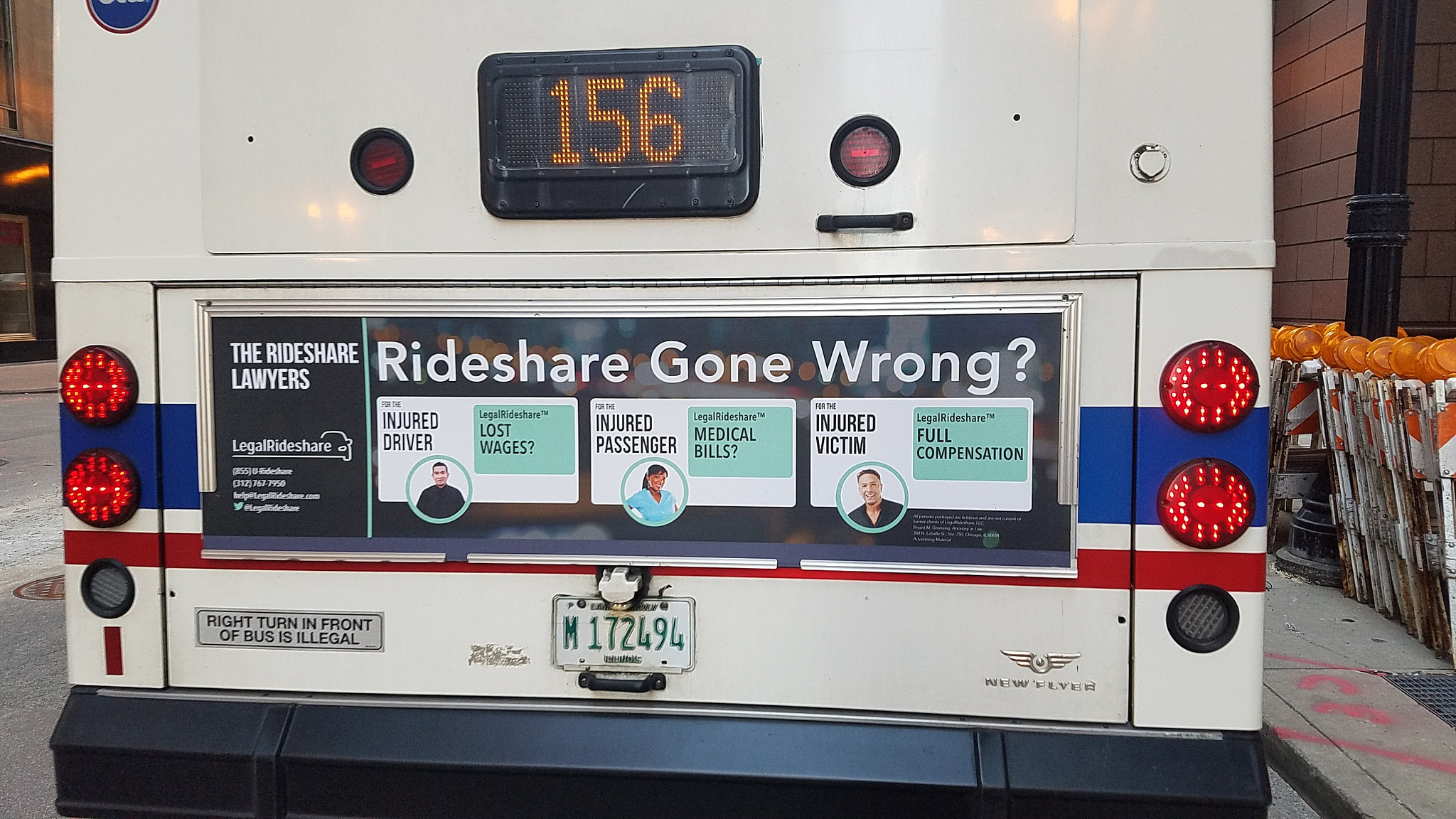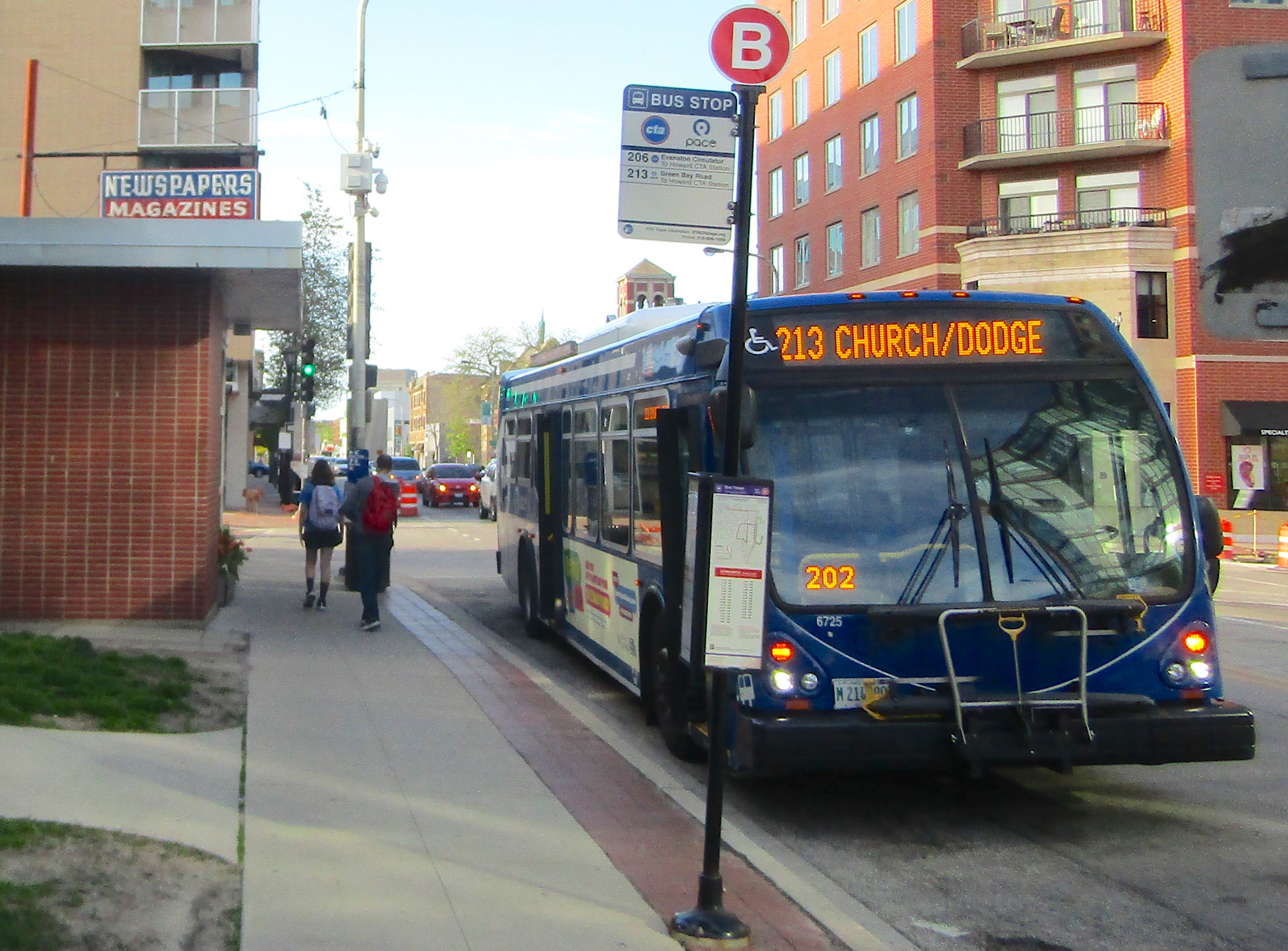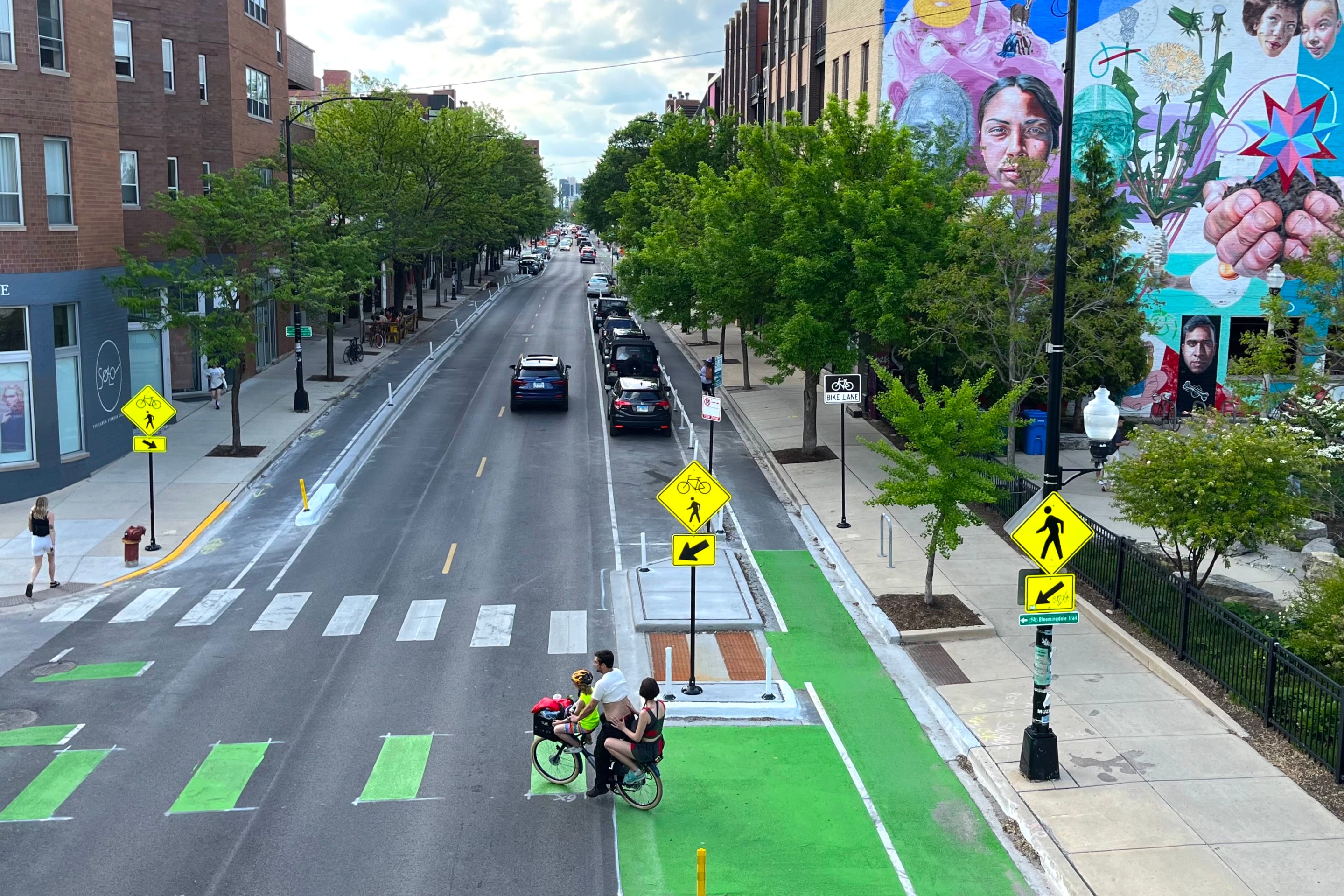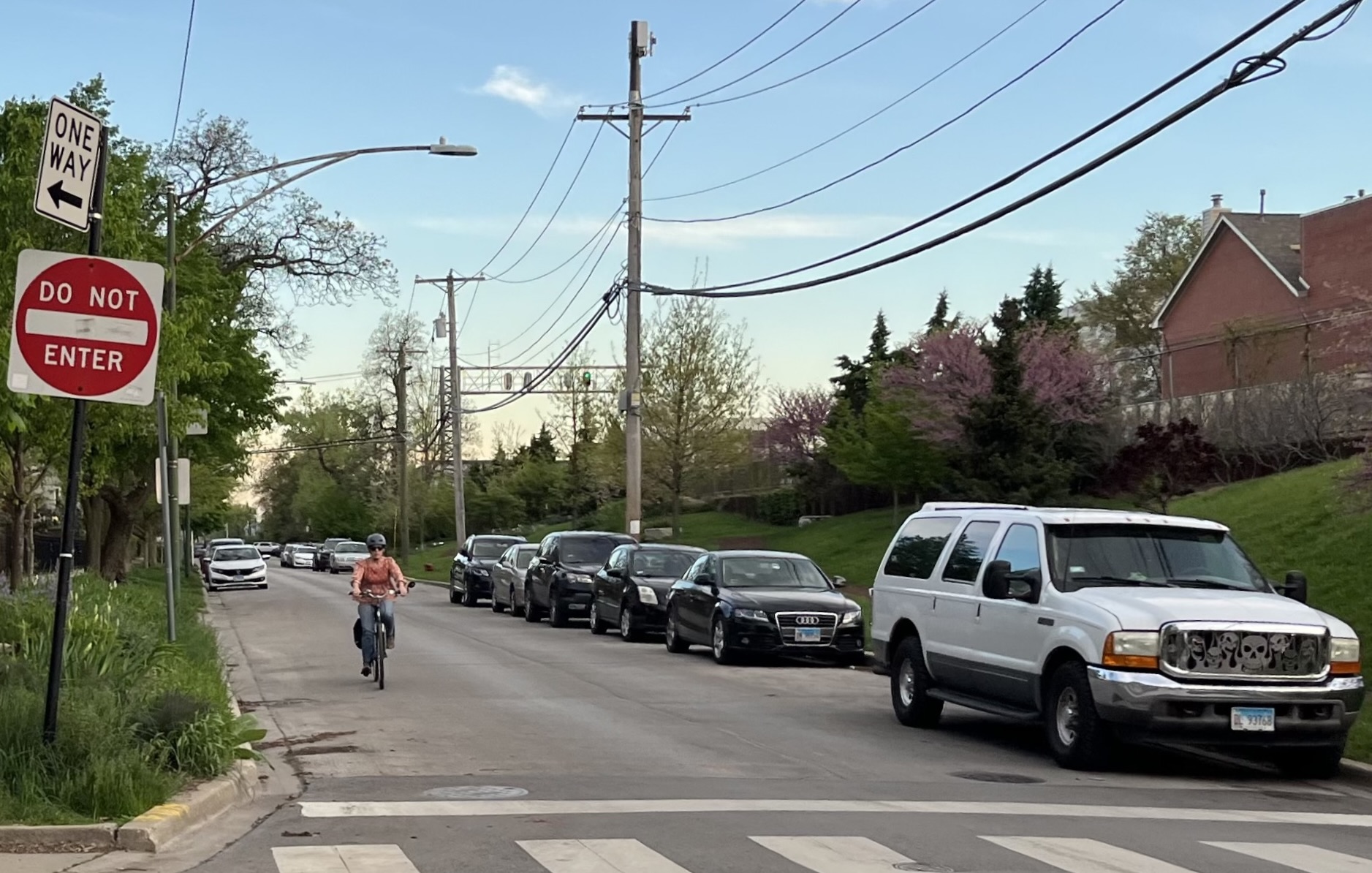Why Taxing Ride Share to Fund the CTA Makes Sense
11:55 AM CDT on October 26, 2017

A new study, and CTA officials, say ride-share has been cannibalizing transit ridership. Photo: Filip Frącz
[Streetsblog editor John Greenfield publishes a weekly transportation column in the Chicago Reader. We syndicate the column on Streetsblog Chicago after it comes out online.]
It's become all too easy to opt out of taking the CTA with the quick, convenient allure of Lyft and Uber just a couple smartphone clicks away. Recent studies have reported that it's becoming common for those who can afford ride share to substitute it in place of transit, walking, or biking rather than just using it to replace private car trips. The outcome could be a less efficient, safe, environmentally friendly, and just city.
That's why Mayor Rahm Emanuel's plan to modestly hike the city's ride-share fees to help fund the CTA is a sensible idea. It could enable the transit agency to avoid fare increases and improve service, which would help level the playing field and stop transit ridership bleeding. While CTA use had been growing in recent years, the latest figures show that bus and rail ridership has slipped a few percentage points in 2017.
Last week when Emanuel released his 2018 budget proposal, he announced that Chicago is planning to add a 15-cent surcharge to the existing city ride-share fee of 52 cents per trip, promising that the additional revenue would be earmarked for the CTA, not used to plug the city's budget hole. The surcharge, which will affect Lyft, Uber, and smaller competitors, would be raised 20 cents, to 72 cents total, in 2019, which wouldn't be a hardship for ride-share users, whom research shows tend to be relatively affluent.
"To ensure the CTA can continue to invest in infrastructure upgrades to its train and bus lines, Chicago will become the first city in the nation to institute a fee on the rideshare industry dedicated specifically to mass transit and mass transit improvements," the mayor's office said in a statement last week. The 2018 budget includes $16 million for the transit agency, funded by the ride-share hike, with $21 million expected in 2019.
Asked for their perspective on the proposed fee, representatives for Lyft and Uber didn't directly address the issue but stated that they believe ride share is part of the solution for providing more sustainable travel options in cities.
"At Uber we believe that the future of urban transportation will be a mix of public transit and ridesharing, and that by encouraging residents to use a variety of options, we can all ride together to build a better Chicago," said the company in a statement.
Lyft spokesman Campbell Matthews wrote, "We appreciate the mayor working to build a sustainable future for ride-sharing drivers and passengers in Chicago and look forward to continue collaborating on providing safe, convenient and affordable transportation options for the city."
The CTA will be putting out its own budget in November. It faces a number of fiscal challenges, including several funding cuts in recent years, such as a $76 million reduction in state funding for regional transit that was part of this summer's Illinois budget deal. The transit agency also needs an estimated $13 billion to bring its existing rail and bus networks to a state of good repair.
Then there are CTA ridership decreases. According to the agency's latest monthly ridership report, released in May, the year-to-date total for bus and rail ridership had declined by 4.3 percent compared to 2017, including a 3.6 percent drop in rail ridership and a 4.9 decrease in bus ridership.
"There are a number of factors contributing to CTA's recent ridership declines, including historically low gas prices and the expansion of ride-hailing," agency spokeswoman Tammy Chase says. "Preliminary analysis of recent ridership shows that declines have been more pronounced in the late-evening and early-morning hours. AM and PM rush ridership has been less impacted, but has still seen some declines."
The drop in ridership is in keeping with the findings of a new study from the University of California, Davis, which randomly surveyed more than 4,000 urban and suburban residents in Chicago, New York, Los Angeles, the Bay Area, Seattle, D.C., and Boston. The report found that ride-share users heavily skew younger, college educated, and affluent–33 percent of respondents who make $150,000 a year or more said they use ride share, while only 15 percent of those who make $30,000 or less said they do so.
According to the study, ride share seems to be having a modest positive effect on car ownership, with 9 percent of respondents who use the service reporting that it influenced a decision not to buy a car, or to sell one they previously owned. However, those who got rid of a vehicle have replaced those private car trips with additional ride-share use, and it's not known what effect this has had on net vehicle miles traveled.
The report found that after beginning to use ride share, people were 6 percent less likely to ride buses and 3 percent less likely to use light rail. Interestingly, respondents were 3 percent more likely to use commuter rail such as Metra, which suggests a complementary rather than competitive relationship, with commuters using the service for "last mile" trips to and from stations.
According to the study, ride-share trips are often replacing more space-efficient transportation modes—49 percent to 62 percent of these journeys would have otherwise been made by transit, walking, biking, or not at all. This indicates that ride share is adding to congestion in cities. "Based on mode substitution and ride-hailing frequency of use data, we conclude that ride-hailing is currently likely to contribute to growth in vehicle miles traveled in the major cities represented in this study," the researchers state.
The findings don't bode well for the future of transit. When people who can afford to take Uber or Lyft choose to do so because it's quicker and more dependable than buses or trains, that means more cars on the road, which could in turn slow down buses and lead to transit revenue shortfalls, resulting in fare hikes and/or and less frequent service. Those who can't afford ride share may then have to deal with increasingly poor bus performance.
Faced with the prospect of more transit trips being replaced by ride-share trips, the Active Transportation Alliance, in a blog post last week, applauded Emanuel's proposal, calling it "good news for everyone who cares about preserving healthy, sustainable, and equitable transportation options across Chicago." Government relations director Kyle Whitehead noted that the UC Davis report is in keeping with other recent studies that found ride share is reducing transit ridership and increasing congestion in New York and San Francisco.
Whitehead wrote that replacing active transportation trips with car trips makes our streets more dangerous, reduces physical activity, increases greenhouse gas emissions, and disproportionately hurts the poor. He observed that if Lyft and Uber were to share their data with the public, which they're currently not required to do in Chicago, it could help influence policies for managing ride share so that the technology does the local transportation system more good than harm. "Using revenue from a tax increase to fund public transit improvements is a step in the right direction."
Not everyone feels that way, of course. "CTA needs to raise fares to $3.00 for trains and $2.50 for buses [from $2.25 and $2, respectively] to pay for capital improvements, not . . . tax people using a non-competitive service," wrote one Streetsblog Chicago commenter.
But as the recent numbers show, ride share is, in fact, competing with rather than complementing, public transit. Uber and Lyft certainly can be handy for trips that aren't practical by public transportation, and it's great that the services can help reduce drunk driving and car ownership. But unless Chicago take steps to adequately fund the CTA, ride share will continue to disrupt local transit, and the city will be the worse for it.
In addition to editing Streetsblog Chicago, John writes about transportation and other topics for additional local publications. A Chicagoan since 1989, he enjoys exploring the city on foot, bike, bus, and 'L' train.
Read More:
Stay in touch
Sign up for our free newsletter
More from Streetsblog Chicago
Since COVID, Pace ridership has fared better on major corridors and in north, northwest suburbs than in south, west ‘burbs
The suburban bus system's top five busiest routes largely maintained their ridership rankings.
Due to incredible support from readers like you, we’ve surpassed our 2023-24 fundraising goal
Once again, the generosity of walk/bike/transit boosters is fueling our reporting and advocacy.
Which Metra corridor would become more bike-friendly and greener under a new plan? Ravenswood!
Thanks to plans to convert little-used parking spaces, the avenue is slated to get a new bike lane, and the Winnslie Parkway path and garden will be extended south.



